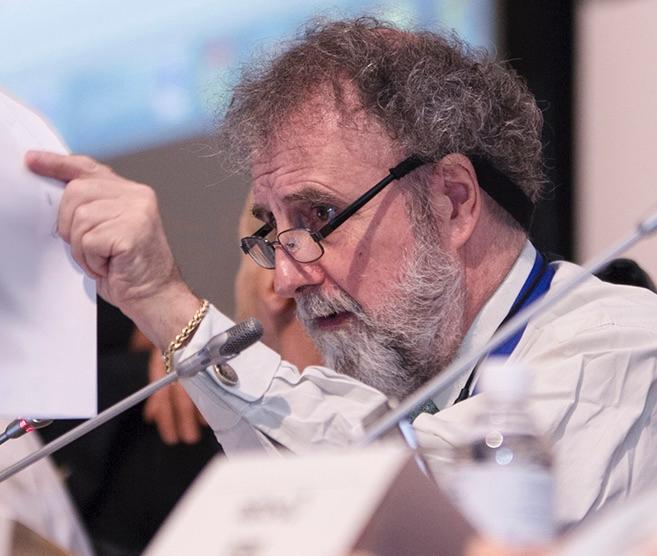Three of the world’s most eminent experts on the intersection of nature and human well-being were announced recently in Bonn, Germany as co-chairs of a new global assessment commissioned by the 125 governments comprising the Intergovernmental Science-Policy Platform on Biodiversity and Ecosystem Services (IPBES).

Professors Sandra Díaz (Argentina), Eduardo Brondízio (Brazil & USA) and Josef Settele (Germany) will lead more than 100 expert authors from around the world in a three-year multidisciplinary collaboration to produce the IPBES Global Assessment on Biodiversity and Ecosystem Services.
Speaking about the significance and scope of the undertaking, Sir Robert Watson, Chair of the IPBES, said: “In 2005, the Millennium Ecosystem Assessment (MA), which I co-chaired, changed the way we look at our world. The consensus of the largest group of social and natural scientists ever assembled to assess knowledge in this area was that humanity was putting such strain on our environment that the Earth’s ecosystems might be unable to sustain future generations.
“The IPBES Global Assessment is the intellectual progeny of and scientific successor to the MA. Its findings will be the basis for national and international decision-making by governments, the private sector and civil society over the next decade and beyond – providing the science to underpin success of the new Sustainable Development Goals.”
Covering a timeframe from the middle of the last century until the middle of this century, the assessment will analyse the state of knowledge about how people and nature interact, direct and indirect drivers of change, values, response options and nature’s benefits to people. It will explore the contributions of biodiversity and ecosystems to long-term quality of life – focusing on the synergies and trade-offs needed to balance the economic, social and environmental dimensions of the 2030 Agenda for Sustainable Development, as well as progress made on the UN Strategic Plan for Biodiversity, including the Aichi Biodiversity Targets.
Asked about the differences between the MA and the new assessment, Dr. Anne Larigauderie, IPBES Executive Secretary, explained: “The Global Assessment will offer a much-needed update on the status and trends of biodiversity and ecosystem services – which were last reviewed more than a decade ago. It also introduces a number of innovations, in addition to its unprecedented intergovernmental mandate – having been specifically requested by our Member States, based on a detailed blueprint. It is guided by the IPBES conceptual framework, which recognises different world views and incorporates a wide range of values and knowledge systems including, for the first time, vital indigenous and local knowledge. The careful balancing of our participating experts is another source of great value – with equitable representation of the natural and social sciences, geographical regions, gender and professional experience.”
The first author meeting that brought together almost 150 participants held a week ago. It included the newly announced co-chairs, coordinating lead authors, lead authors as well as members of the IPBES Multidisciplinary Expert Panel, Bureau and technical support unit. A first order draft of the Global Assessment is expected to be ready for expert review in mid-2017, with two further rounds of author meetings, reviews and revisions, before submission to IPBES governments for final approval in May 2019. The Assessment will also be a key input to the Fifth Global Biodiversity Outlook (GBO-5) of the Convention on Biological Diversity, to be published in 2020.
Sandra Díaz is a Professor of Community and Ecosystem Ecology at the National University of Córdoba and a senior member of the National Research Council of Argentina (CONICET) at Instituto Multidisciplinario de Biología Vegetal. Founder and director of the international initiative Núcleo DiverSus on Diversity and Sustainability, she has authored more than 150 scientific publications, many of them in prominent academic journals, and served in leading positions for the IPCC, the MA, Future Earth and DIVERSITAS.
Eduardo S. Brondízio is a Professor in the Department of Anthropology in the College of Arts and Sciences at Indiana University Bloomington, co-Editor-In-Chief of Current Opinion on Environmental Sustainability and serves on a range of international scientific bodies including the Science Committee of the Future Earth programme. Committed for three decades to research on human-environment interaction in the Amazon, he is the author of more than 180 scientific publications and has contributed to numerous regional and global assessments including the MA.
Josef Settele is at the Helmholtz Centre for Environmental Research – UFZ, heading the animal ecology and social-ecological research section. He is a Professor of Ecology at Martin-Luther-University of Halle-Wittenberg, and a member of the German Centre for Integrative Biodiversity Research – iDiv. He served as a coordinating lead author for both the IPCC and the recent IPBES pollination assessment, and is one of the most prolific scientific authors in the field, with more than 370 scientific publications, including more than 30 books.
